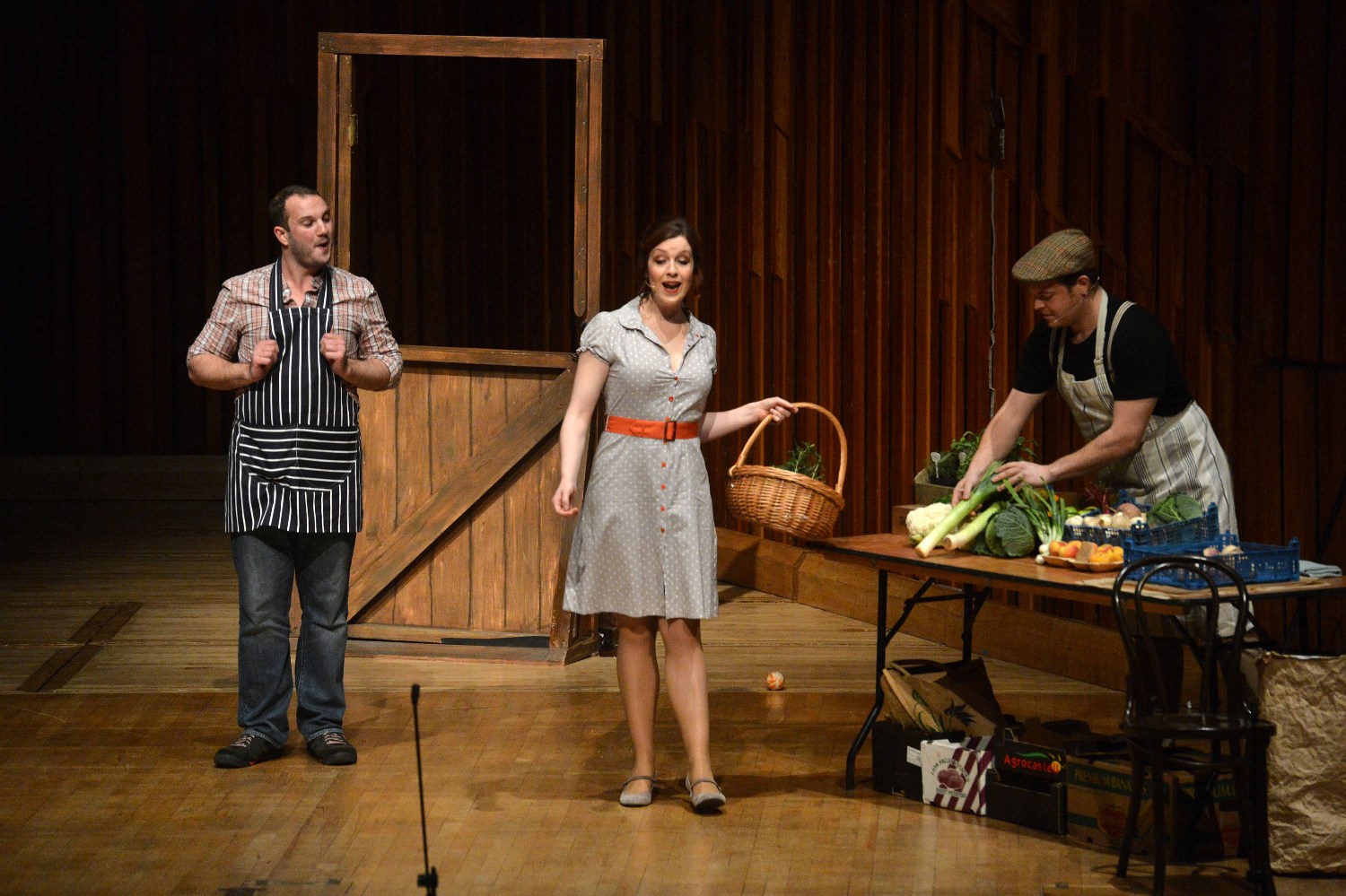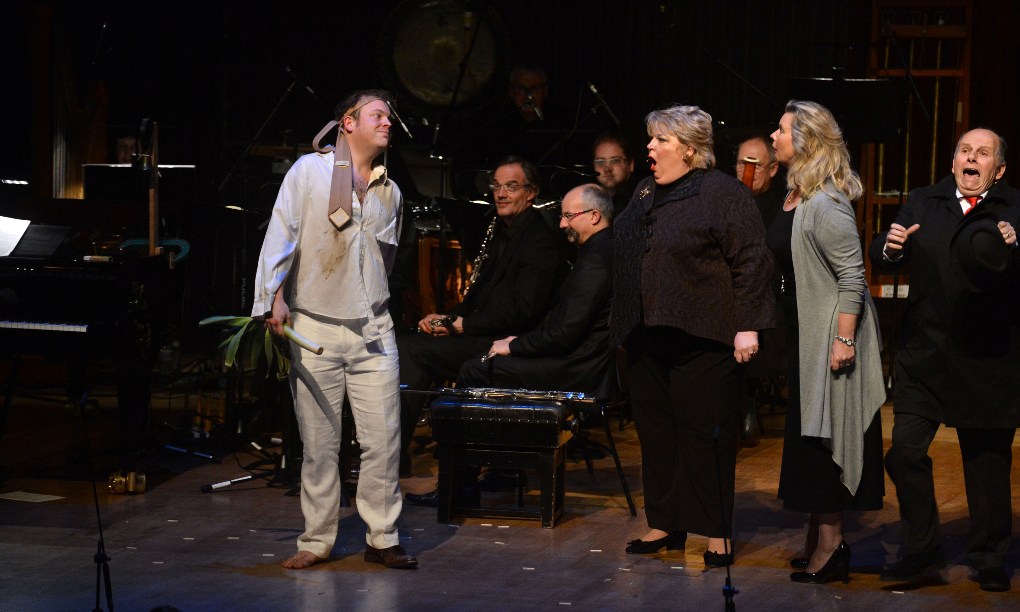Three cheers for good old Albert, natural laugh-out-loud heir of Verdi’s Falstaff and Puccini’s Gianni Schicchi, and the best possible way to mark creator Britten’s being one hundred years and one day old. Youth has its day in both those earlier masterpieces, but the lovers are subordinate to the middle-aged comic protagonists. Here they're the equals of a hero who is no scamster but a shy grocer’s boy who busts out drinking and worse to loosen the apron strings of a prim community. He may have had his funniest incarnation yet last night in young Andrew Staples' characterisation, very much at the centre - alongside Steuart Bedford’s 13-piece BBC Symphony Orchestra team - of a peerless cast.
 The special wonder of Kenneth Richardson’s Barbican semi-staging was how timeless this comedy remains. I eat my words about Eric Crozier’s libretto, a luminous transformation of Maupassant's rather sad little story, being next best to Auden’s for Paul Bunyan among Britten’s operas: it’s joint first. Auden might have attempted to play too much with the vernacular; Crozier (pictured with Britten at Glyndebourne in 1946 by Maria Austria, part of the National Portrait Gallery's current photo exhibition) hits it spot on, and manages to rhyme, mostly effortlessly, into the bargain. And he created a more memorable ensemble of characters, on which last night’s first-rate team seemed happy to capitalize. I don’t know whether it’s been done before, but Roderick Williams and Gillian Keith were determined to make the most of a budding old-fashioned romance between sententious vicar and gushing schoolma’am (after all, they do start duetting the Song of Solomon).
The special wonder of Kenneth Richardson’s Barbican semi-staging was how timeless this comedy remains. I eat my words about Eric Crozier’s libretto, a luminous transformation of Maupassant's rather sad little story, being next best to Auden’s for Paul Bunyan among Britten’s operas: it’s joint first. Auden might have attempted to play too much with the vernacular; Crozier (pictured with Britten at Glyndebourne in 1946 by Maria Austria, part of the National Portrait Gallery's current photo exhibition) hits it spot on, and manages to rhyme, mostly effortlessly, into the bargain. And he created a more memorable ensemble of characters, on which last night’s first-rate team seemed happy to capitalize. I don’t know whether it’s been done before, but Roderick Williams and Gillian Keith were determined to make the most of a budding old-fashioned romance between sententious vicar and gushing schoolma’am (after all, they do start duetting the Song of Solomon).
Crude caricatures were avoided in the village committee determined to plonk the May-Queen’s orange blossom crown on Albert in the absence of suitable local maidens – which doesn’t mean we failed to laugh at the Superintendant Budd of Matthew Rose, a tad free of pitch and note-value but developing as a bass of colossal force, or the automatic rifle-fire May Day speech of Adrian Thompson’s Mayor. Christine Brewer, the greatest Isolde of our times, was luxuriously cast as moralizing Lady Billows: after all, there are plenty of top B flats and even the occasional C in amongst all the dudgeon. Her keynote May Day speech brought comedy to hysteria pitch with its collapse into nationalistic clichés, and the coda – “stand to receive this purse of otterskin – me father shot the brute in ’56 on Christmas Eve – with five and twenty sovereigns inside” – was just as funny. Backing her up with rich vocals was Gaynor Keeble as between-two-worlds housekeeper Florence Pike, excelling in her Act Two harangue.
 Above all there was great beauty of line when Britten allows it, and Richardson let his cast be sincere in the moment, supremely so in Williams’ melting delivery of Mr Gedge’s “virtue” solo and the lament of Albert’s mum, the ever superb Catherine Wyn-Rogers playing it straight: no sending-up here when there’s a real possibility, to Mrs Herring at least, of her son being lost for ever. But the real plums belong to Britten’s anthems for happy youth. If the three kids seemed a bit muted from halfway back on the Barbican stage – a tricky acoustic, especially with the instrumental ensemble dead-centre, and stage left was not helpful for anybody from where I was sitting – they came into their own in the ceremonials, while Albert and the young lovers could not have been better cast.
Above all there was great beauty of line when Britten allows it, and Richardson let his cast be sincere in the moment, supremely so in Williams’ melting delivery of Mr Gedge’s “virtue” solo and the lament of Albert’s mum, the ever superb Catherine Wyn-Rogers playing it straight: no sending-up here when there’s a real possibility, to Mrs Herring at least, of her son being lost for ever. But the real plums belong to Britten’s anthems for happy youth. If the three kids seemed a bit muted from halfway back on the Barbican stage – a tricky acoustic, especially with the instrumental ensemble dead-centre, and stage left was not helpful for anybody from where I was sitting – they came into their own in the ceremonials, while Albert and the young lovers could not have been better cast.
Marcus Farnsworth as Sid, the butcher’s boy who abets Albert’s rite of passage by spiking his May Day lemonade with rum, and Kitty Whately as his girl Nancy from the bakery were so easy together, so perfect of phrase in their two delicious and slightly off-kilter love duets: a better paragon of the new-generation singers you’d not find anywhere. And Staples (pictured with them above) was there claiming character for Albert from the start: not for him anything “disconcertingly blurry” about the lad in the opera's first half, as the Britten-ubiquitous Paul Kildea claims in another of his programme notes to ignore any musical virtues (were it not for the word "librettist", you'd think from it that Albert Herring is a straight play, though to be fair there were a few references to the music in the synopsis). This is a boy ready to burst; intoxication is merely the touch paper, as with the potion in Wagner’s Tristan und Isolde, thrice quoted by Britten in connection with the catalytic drink.
 Already in Act One Scene Two's lyric peak, “It seems as clear as clear can be”, Staples was generously connecting the lines and giving us all the yearning Britten’s straightforward steps can take. But it was in the great post-party monologue, surely modelled in essence if not in situation on Beckmesser’s soliloquy in Die Meistersinger, that comic genius came to the fore. It helps that Staples looks like a cross between Eddie Izzard and Graham Norton. Already known as a director of some talent, the tenor must surely have worked out the gags himself: the box of Swan Vestas to light the gas sitting by the conductor’s side, the drunken leaning on consummate flautist Michael Cox, leek rampant in hand when Albert goes off on his binge that’s wilted on his return (Staples pictured above with Brewer, Keeble and Thompson) and used to pat the bottom of outraged Lady B when he asks her to let him get on in the shop, “for I’m all behind”.
Already in Act One Scene Two's lyric peak, “It seems as clear as clear can be”, Staples was generously connecting the lines and giving us all the yearning Britten’s straightforward steps can take. But it was in the great post-party monologue, surely modelled in essence if not in situation on Beckmesser’s soliloquy in Die Meistersinger, that comic genius came to the fore. It helps that Staples looks like a cross between Eddie Izzard and Graham Norton. Already known as a director of some talent, the tenor must surely have worked out the gags himself: the box of Swan Vestas to light the gas sitting by the conductor’s side, the drunken leaning on consummate flautist Michael Cox, leek rampant in hand when Albert goes off on his binge that’s wilted on his return (Staples pictured above with Brewer, Keeble and Thompson) and used to pat the bottom of outraged Lady B when he asks her to let him get on in the shop, “for I’m all behind”.
Crucially, there were pathos and phantasmagoria in the night-music too, the point at which the already wonderful BBCSO soloists began to fuse supernaturally with the singers. Hard to tell who was the better whistler: Staples, Farnsworth or violinists Stephen Bryant and Anna Smith. Invidious as it may be to select from the chamber group, since Britten writes as well for each of the players as he does for the singers, I have to note unforgettable moments from oboist Richard Simpson lamenting with Mrs H, harpist Sioned Williams’ loveladen flourishes and Richard Hosford’s haunting bass clarinet. It seemed incredible, too, that Bedford should be as nuanced at the piano as he was in keeping the ensemble tight and clear: was that doubling-up a first?
All this was a vivid reminder that in making the most of economics – Albert, like The Rape of Lucretia before it, was designed for touring, a fact this resourceful semi-staging pointed up – Britten managed to be so miraculous with his team of 26 singers and instrumentalists. And it’s been one of the joys of centenary year to follow in chronological order the path from Paul Bunyan through the Festival Hall concert Peter Grimes and the dip (for me at any rate) of Lucretia at Glyndebourne to the comic soaring of this Albert Herring – a work, or so it seemed last night, with no kind of fault or flaw.















Add comment